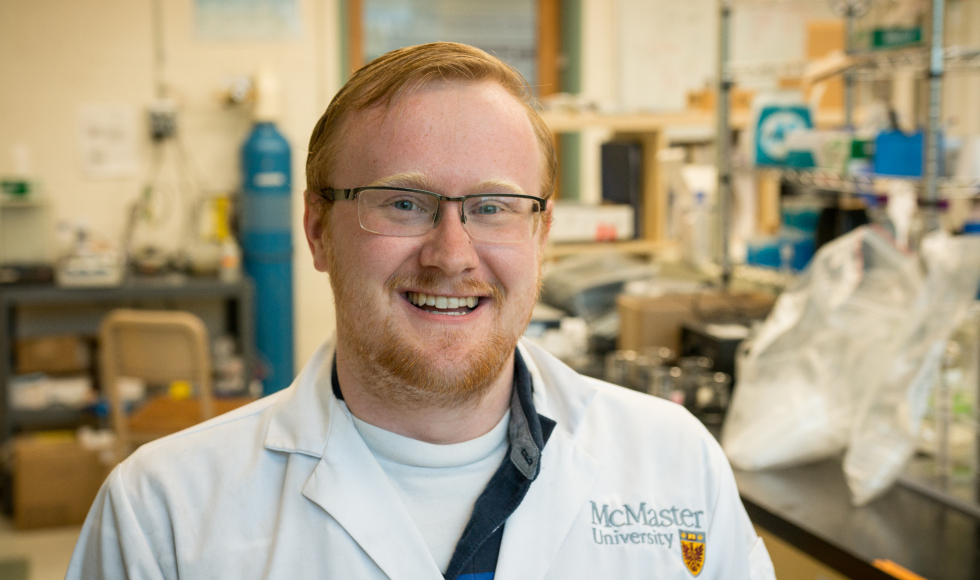Meet Vanier Scholar Ryan LaRue

Photo by Kareem Baassiri
BY Kareem Baassiri
September 10, 2018
Ryan LaRue is a PhD student in the Department of Chemical Engineering. Here, he talks about his research, why it’s important, and what he does when he’s not working in the lab.
Name: Ryan LaRue
Title of research: Developing the next generation of water treatment technology
Q: What is your research about?
A: My research is centered on the area of water and wastewater treatment. Globally, there’s a lot of people out there who can’t access clean water due to polluted water sources, the lack of water and so on. My research in particular aims to address some of these challenges. My lab creates novel membrane and membrane technologies, and using those technologies in areas where water is hard to treat (e.g. mining areas, municipal water treatment etc.)
A membrane is a thin film that is selective to certain substances (e.g. a reverse osmosis allows selective permeation of through it). It can obtain things such as salts and other substances that it simply doesn’t want in it. The idea behind this is to remove toxins such as heavy metals that could be discharged into your water and consumed. My role in this is to develop new and novel membranes, in particular ones that can absorb or capture certain materials. For example, if we think back to Flint Michigan where they have a lot of lead in their drinking water, I’m developing membranes that will selectively capture lead from water.
Another aspect of my research is aiming to prevent things from being absorbed in water.
Q: How will you use this (scholarship) moving forward in your future research?
A: It will definitely help allow me to focus on other aspects of my life. During my time in my undergraduate studies, paying off my debt from tuition, rent and so on was challenging. Now that I’m in graduate school, I can very comfortably live with my expenses.
Q: What will students be working on as part of this project with you?
A: I have some undergraduate students who will be helping me out in the lab. Their roles are help out in the day-to-day experiments and analysis that go on within the research. The really great part of it is that they are fantastic students and they also help me get my research going faster, as I am only one person.
Q: What impacts do you think your research will have?
A: The area of water and wastewater treatment is a big thing these days, especially because there are some people who simply don’t have access to clean water (for drinking, agriculture etc.). My eventual goal with my research is to develop technologies that are impactful to people, so that they can get access to clean water for whatever they may need it for.
Q: How did you feel when you found out that you had received the Vanier Scholarship?
A: I was really excited when I found out that I have received the Vanier Scholarship. It’s a really important award that a lot of distinguished people have received this award. I really hope to make an impact similar to the people who have received the award in the past.
Q: Timeline for this research?
A: My PhD is going to be about four to five years, and I’m finishing up my first year now. The fun thing about research is you have no clue where it’s going: you suddenly discover that one thing works really well and you go off on a tangent and you can do something new from there. You can learn tons of new things and go to places you’ve never thought before.
Q: What do you do for fun?
A: In addition to being a chemical engineer, one thing that I do is play the piano. I’ve been playing the piano for almost 19 years now, and I accompany people who sing and play musical instruments. I am also quite active in the area of musical theatre. I come from a small town Sault St. Marie, Ontario, and every year I go back to my high school and help out in the musical theatre program there. I usually act as the pianist to accompany the vocalists and people on stage, as well as the rest of the band.
The Vanier Canada Graduate Scholarships are the Government of Canada’s most prestigious awards for doctoral students. The program provides $50,000 per year for up to three years to students who demonstrate academic excellence, research potential and leadership ability. Up to 166 awards are distributed each year by three federal granting agencies: the Canadian Institutes of Health Research (CIHR), the Natural Sciences and Engineering Research Council (NSERC) and the Social Sciences and Humanities Research Council (SSHRC). This year, 10 McMaster students received Vanier scholarships.


